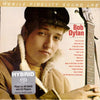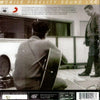







Bob Dylan - Bob Dylan (Hybrid SACD, Stereo, Ultradisc UHR)
ORDER LIMITED TO ONE ITEM PER CUSTOMER
Bob Dylan – vocals, acoustic guitar, harmonica [click here to see more vinyl featuring Bob Dylan]
Written by Bob Dylan
1 SACD, gatefold jacket
Numbered edition limited to 3,000 copies
Original analog Master tape : YES
Stereo
Studio
Label : MOFI
Original Label : Columbia
Recorded November 20 and 22, 1961 in Columbia Studio A, 799 Seventh Avenue, New York City
Produced by John Hammond
Mastered by Shawn R. Britton at Mobile Fidelity Sound Lab, Sebastopol, CA on The Gain 2 System™
Manufactured by Sony Music Entertainment
Glass master manufactured at Sony DADC
Originally released in 1962
Reissued in 2014
Tracks:
- You're No Good
- Talkin' New York
- In My Time Of Dyin'
- Man Of Constant Sorrow
- Fixin' To Die
- Pretty Peggy-O
- Highway 51
- Gospel Plow
- Baby, Let Me Follow You Down
- House Of The Risin' Sun
- Freight Train Blues
- Song To Woody
- See That My Grave Is Kept Clean
Reviews :
"Bob Dylan's first album is a lot like the debut albums by the Beatles and the Rolling Stones -- a sterling effort, outclassing most, if not all, of what came before it in the genre, but similarly eclipsed by the artist's own subsequent efforts. The difference was that not very many people heard Bob Dylan on its original release (originals on the early-'60s Columbia label are choice collectibles) because it was recorded with a much smaller audience and musical arena in mind. At the time of Bob Dylan's release, the folk revival was rolling, and interpretation was considered more important than original composition by most of that audience. A significant portion of the record is possessed by the style and spirit of Woody Guthrie, whose influence as a singer and guitarist hovers over "Man of Constant Sorrow" and "Pretty Peggy-O," as well as the two originals here, the savagely witty "Talkin' New York" and the poignant "Song to Woody"; and it's also hard to believe that he wasn't aware of Jimmie Rodgers and Roy Acuff when he cut "Freight Train Blues." But on other songs, one can also hear the influences of Bukka White, Blind Lemon Jefferson, Blind Willie Johnson, and Furry Lewis, in the playing and singing, and this is where Dylan departed significantly from most of his contemporaries. Other white folksingers of the era, including his older contemporaries Eric Von Schmidt and Dave Van Ronk, had incorporated blues in their work, but Dylan's presentation was more in your face, resembling in some respects (albeit in a more self-conscious way) the work of John Hammond, Jr., the son of the man who signed Dylan to Columbia Records and produced this album, who was just starting out in his own career at the time this record was made. There's a punk-like aggressiveness to the singing and playing here. His raspy-voiced delivery and guitar style were modeled largely on Guthrie's classic '40s and early-'50s recordings, but the assertiveness of the bluesmen he admires also comes out, making this one of the most powerful records to come out of the folk revival of which it was a part. Within a year of its release, Dylan, initially in tandem with young folk/protest singers like Peter, Paul & Mary and Phil Ochs, would alter the boundaries of that revival beyond recognition, but this album marked the pinnacle of that earlier phase, before it was overshadowed by this artist's more ambitious subsequent work. In that regard, the two original songs here serve as the bridge between Dylan's stylistic roots, as delineated on this album, and the more powerful and daringly original work that followed. One myth surrounding this album should also be dispelled here -- his version of "House of the Rising Sun" here is worthwhile, but the version that was the inspiration for the Animals' recording was the one by Josh White." AllMusic Review by Bruce Eder
Ultra High-Resolution (UHR) is a dual-layer hybrid SACD recorded with Direct Stream Digital Technology at a sampling rate of 11.2 MHZ and a frequency response of DC to 100KHz. In addition, a high-precision down-conversion is utilized for the CD layer (16bit/44.1kHz) to preserve the sonic integrity of the original DSD capture. The result: State-of-the-art sound on any machine that can play either standard compact discs or SACDs.
Ratings :
AllMusic : 4 / 5 , Discogs : 4.31 / 5



